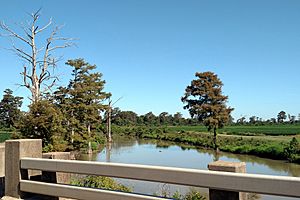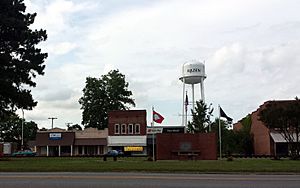Prairie County, Arkansas facts for kids
Quick facts for kids
Prairie County
|
|
|---|---|
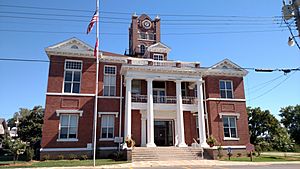
Prairie County Courthouse, Des Arc
|
|
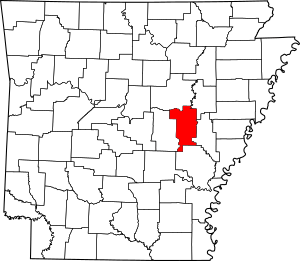
Location within the U.S. state of Arkansas
|
|
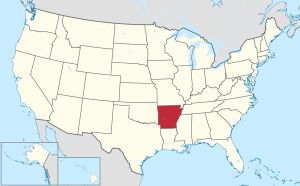 Arkansas's location within the U.S. |
|
| Country | |
| State | |
| Founded | November 25, 1846 |
| Named for | Grand Prairie |
| Seat | Des Arc, DeValls Bluff |
| Largest city | Des Arc |
| Area | |
| • Total | 676 sq mi (1,750 km2) |
| • Land | 648 sq mi (1,680 km2) |
| • Water | 28 sq mi (70 km2) 4.1%% |
| Population
(2020)
|
|
| • Total | 8,282 |
| • Density | 12.251/sq mi (4.730/km2) |
| Time zone | UTC−6 (Central) |
| • Summer (DST) | UTC−5 (CDT) |
| Congressional district | 1st |
Prairie County is in the Central Arkansas region of the U.S. state of Arkansas. The county is named for the Grand Prairie, a subregion of the Arkansas Delta known for rice cultivation and aquaculture that runs through the county. Created as Arkansas's 54th county in 1846, Prairie County is home to four incorporated towns, including DeValls Bluff, the southern district county seat, and two incorporated cities, including Des Arc, the northern district county seat. The county is also the site of numerous unincorporated communities and ghost towns. Occupying 676 square miles (175,000 ha), Prairie County is the median-sized county in Arkansas. As of the 2020 Census, the county's population was 8,282. Based on population, the county is the ninth-smallest county of the 75 in Arkansas.
The county is crossed by Interstate 40 (I-40), a major east–west Interstate highway running from California to North Carolina, as well as four United States highways (U.S. Route 63 [US 63], US 70, US 79, and US 165). Eleven Arkansas state highways run in the county. Prairie County is served by two public owned/public use general aviation airports and six potable water systems.
Contents
History
The county at first was land given to Cherokee Indians resettled from Tennessee and was the Western band of Cherokee reservation from 1812 to 1836. Even today, an estimated 2,000 residents have some American Indian ancestry.
The town of Fredonia (Biscoe) was named for the unsuccessful 1826 attempt of Arkansas Cherokee and to create the Republic of Fredonia by Arkansas Cherokee and Texan settlers in then Mexican Texas. The town of DeValls Bluff was the Western Cherokee's seat, and is now one of Prairie County's seats.
Prairie County suffered greatly during the Civil War. Des Arc was partly destroyed, and a local historian estimated that not more than 15 horses were left in the county by the war's end. The rest had been taken by soldiers of one army or the other.
Stern's Medlar, a previously unknown plant species, was discovered in Prairie County as recently as 1990. It is not known to grow anywhere else in the world. The plant is critically endangered, with only 25 known specimens, all growing within a single small wood, now protected as the Konecny Grove Natural Area.
Geography
The county is located between two primary geographic regions of Arkansas: Central Arkansas and the Arkansas Delta (in Arkansas, usually referred to as "the Delta"). The Arkansas Delta is a subregion of the Mississippi Alluvial Plain, which is a flat area consisting of rich, fertile sediment deposits from the Mississippi River between Louisiana and Illinois. The county is often described as being within the Grand Prairie, a subdivision of the Arkansas Delta known today for rice farming and aquaculture, rather than Central Arkansas or the Delta. It is this geographic feature from which the county derives its name. According to the U.S. Census Bureau, the county has a total area of 676 square miles (1,750 km2), of which 648 square miles (1,680 km2) is land and 28 square miles (73 km2) (4.1%) is water.
Prior to settlement, Prairie County was large, flat grassland distinct from the swamps and bayous in the nearby Delta. Although cotton and other row crops grew well in the Prairie's silty loam soil, rice production changed the cultivation patterns in the county at the turn of the nineteenth century. Although some prairie and riparian areas has been preserved in conservation areas, a large portion (44 percent) of the county remains in cultivation. Another large land use in Prairie County is the Cache River NWR and Wattensaw Wildlife Management Area (WMA), owned by the United States Fish and Wildlife Service and Arkansas Game and Fish Commission, respectively.
The county is located approximately 53 miles (85 km) east of Little Rock and 90 miles (140 km) west of Memphis, Tennessee. Prairie County is surrounded by five other counties: White County to the north, Woodruff County to the northeast, Monroe County to the east, Arkansas County to the south, and Lonoke County to the west.
Climate
Prairie County has a humid subtropical climate (Köppen Cfa). Prairie County experiences all four seasons, although summers can be extremely hot and humid and winters are mild with little snow. July is the hottest month of the year, with an average high of 92 °F (33.3 °C) and an average low of 73 °F (22.8 °C). Temperatures above 100 °F (38 °C) are not uncommon. January is the coldest month with an average high of 48 °F (8.9 °C) and an average low of 31 °F (−0.6 °C). The highest temperature was 109 °F (42.8 °C), and the lowest temperature recorded was −5 °F (−21 °C). Record snowfall in Des Arc occurred January 7, 1912, with 18 inches (46 cm).
| Climate data for Des Arc | |||||||||||||
|---|---|---|---|---|---|---|---|---|---|---|---|---|---|
| Month | Jan | Feb | Mar | Apr | May | Jun | Jul | Aug | Sep | Oct | Nov | Dec | Year |
| Record high °F (°C) | 80 (27) |
82 (28) |
88 (31) |
93 (34) |
98 (37) |
105 (41) |
109 (43) |
109 (43) |
104 (40) |
98 (37) |
87 (31) |
79 (26) |
109 (43) |
| Mean daily maximum °F (°C) | 48 (9) |
53 (12) |
63 (17) |
72 (22) |
81 (27) |
88 (31) |
92 (33) |
91 (33) |
84 (29) |
74 (23) |
62 (17) |
51 (11) |
72 (22) |
| Mean daily minimum °F (°C) | 31 (−1) |
35 (2) |
43 (6) |
52 (11) |
61 (16) |
69 (21) |
73 (23) |
71 (22) |
63 (17) |
51 (11) |
43 (6) |
34 (1) |
52 (11) |
| Record low °F (°C) | −5 (−21) |
−4 (−20) |
15 (−9) |
28 (−2) |
37 (3) |
— | 55 (13) |
48 (9) |
34 (1) |
23 (−5) |
13 (−11) |
−2 (−19) |
−5 (−21) |
| Average precipitation inches (mm) | 3.5 (89) |
4.1 (100) |
4.8 (120) |
5.2 (130) |
5.1 (130) |
3.2 (81) |
3.1 (79) |
2.4 (61) |
3.9 (99) |
4.5 (110) |
5.0 (130) |
5.2 (130) |
50 (1,259) |
| Average snowfall inches (cm) | 1.0 (2.5) |
0 (0) |
0 (0) |
0 (0) |
0 (0) |
0 (0) |
0 (0) |
0 (0) |
0 (0) |
0 (0) |
0 (0) |
0 (0) |
1 (2.5) |
| Source 1: The Weather Channel | |||||||||||||
| Source 2: Weather Database | |||||||||||||
Demographics
| Historical population | |||
|---|---|---|---|
| Census | Pop. | %± | |
| 1850 | 2,097 | — | |
| 1860 | 8,854 | 322.2% | |
| 1870 | 5,604 | −36.7% | |
| 1880 | 8,435 | 50.5% | |
| 1890 | 11,374 | 34.8% | |
| 1900 | 11,875 | 4.4% | |
| 1910 | 13,853 | 16.7% | |
| 1920 | 17,447 | 25.9% | |
| 1930 | 15,187 | −13.0% | |
| 1940 | 15,304 | 0.8% | |
| 1950 | 13,768 | −10.0% | |
| 1960 | 10,515 | −23.6% | |
| 1970 | 10,249 | −2.5% | |
| 1980 | 10,140 | −1.1% | |
| 1990 | 9,518 | −6.1% | |
| 2000 | 9,539 | 0.2% | |
| 2010 | 8,715 | −8.6% | |
| 2020 | 8,282 | −5.0% | |
| 2023 (est.) | 8,036 | −7.8% | |
| U.S. Decennial Census 1790–1960 1900–1990 1990–2000 2010 |
|||
2020 census
| Race | Number | Percentage |
|---|---|---|
| White (non-Hispanic) | 6,924 | 83.6% |
| Black or African American (non-Hispanic) | 922 | 11.13% |
| Native American | 19 | 0.23% |
| Asian | 20 | 0.24% |
| Pacific Islander | 3 | 0.04% |
| Other/Mixed | 249 | 3.01% |
| Hispanic or Latino | 145 | 1.75% |
As of the 2020 United States census, there were 8,282 people, 3,776 households, and 2,495 families residing in the county.
Economy
The economy of Prairie County is primarily agricultural (25.6%), followed by government employees (14.3%), and professional services (14.3%).
Communities
Two incorporated cities and four incorporated towns are located within the county. The largest city and one of two county seats, Des Arc, is located in the northern part of the county on the White River. Des Arc's population in 2010 was 1,717—well below its peak of 2,001 at the 1980 and 1990 Censuses. Hazen and DeValls Bluff (a second county seat) are located near the county's center, both along US 70. Fredonia (Biscoe), near the east side and Ulm, near the south side, are small towns, with 2010 populations of 363 and 205, respectively.
Prairie County has dozens of unincorporated communities and ghost towns within its borders. This is due to early settlers in Arkansas tending to settle in small clusters rather than incorporated towns. For example, communities like Slovak had a post office at some point in their history. Other communities are simply a few dwellings at a crossroads that have adopted a common place name over time. Some are officially listed as populated places by the United States Geological Survey, and others are listed as historic settlements.
Unincorporated communities
- Barrettsville
- Bay Plantation
- Beulah
- Brasfield
- Buck's Landing
- Childers
- Crossroad
- Edwards
- Erwin
- Fairmount
- Four Mile Corner
- Gospoda
- Hallsville
- Harrys
- Hayley
- Hickory Plains
- Jasmine
- Kay
- Letchworth
- Little Dixie
- Lookout
- Mesa
- Peppers Lake
- Peppers Landing
- Plunketts
- Sand Hill
- Screeton
- Siedenstricker
- Slovak
- Tarnceville
- Tollville
- Vaby
Historical communities
- Balle
- Bardill
- Beecher
- Cuneo
- Enarc
- Harrys
- Hunterton
- La Grue
- Leighton
- Mooresville
- Nahay
- Slovaktown
- Spear
- Stineville
- Super
- Thomas
- Uzzett
- Veits
- Willard
- Yuma
Townships
Townships in Arkansas are the divisions of a county. Each township includes unincorporated areas; some may have incorporated cities or towns within part of their boundaries. Arkansas townships have limited purposes in modern times. However, the United States Census does list Arkansas population based on townships (sometimes referred to as "county subdivisions" or "minor civil divisions"). Townships are also of value for historical purposes in terms of genealogical research. Each town or city is within one or more townships in an Arkansas county based on census maps and publications. The townships of Prairie County are listed below; listed in parentheses are the cities, towns, and/or census-designated places that are fully or partially inside the township.
- Belcher
- Bullard
- Calhoun
- Center
- Des Arc
- Hazen (Hazen)
- Hickory Plain
- Lower Surrounded Hill (Fredonia (Biscoe))
- Roc Roe (Ulm)
- Tyler
- Union
- Upper Surrounded Hill
- Watensaw (DeValls Bluff)
- White River (Des Arc)
Infrastructure
Aviation
Prairie County contains two public owned/public use general aviation airports. Both were built during World War II by the United States Army Air Forces, and turned over to local municipalities following the war. Both are predominantly used for agricultural (spraying) operations.
The Hazen Municipal Airport is located west of Hazen along US 70. For the twelve-month period ending April 30, 2014, the facility saw 32,000 general aviation operations. The Stuttgart Municipal Airport is located in southern Prairie County near the Arkansas County line. For the twelve-month period ending July 31, 2014, the facility saw 35,000 general aviation operations, 3,000 military operations, and 2,500 air taxi operations.
Major highways
 Interstate 40
Interstate 40 US Highway 63
US Highway 63 US Highway 70
US Highway 70 US Highway 79
US Highway 79 US Highway 165
US Highway 165 Highway 11
Highway 11 Highway 13
Highway 13 Highway 33
Highway 33 Highway 38
Highway 38 Highway 86
Highway 86 Highway 249
Highway 249 Highway 302
Highway 302 Highway 323
Highway 323 Highway 343
Highway 343 Highway 959
Highway 959 Highway 980
Highway 980
Utilities
The Arkansas Department of Health is responsible for the regulation and oversight of public water systems throughout the state. Prairie County contains six community water systems: Biscoe Waterworks, Des Arc Waterworks, DeValls Bluff Waterworks, East Prairie County Public Water Authority (PWA), Hazen Waterworks, Southeast [White County] PWA, and Ulm Waterworks. Des Arc Waterworks has the largest retail population (3,882), followed by Hazen (1,600), and East Prairie County PWA (699). All community water systems in Prairie County use groundwater as their source of raw water, except Ulm, which purchases all water from Grand Prairie Regional Water and the small portion served by Southeast White County PWA.
See also
 In Spanish: Condado de Prairie (Arkansas) para niños
In Spanish: Condado de Prairie (Arkansas) para niños


